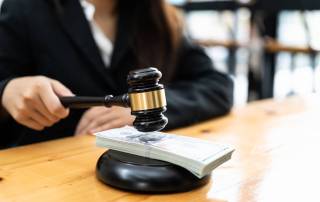In 2019, lawmakers in New York passed legislation eliminating the use of cash bail for non-violent felony charges and most misdemeanors. The move was in respect of the recognition that a person’s liberty should not be pegged on their wealth.
The State changed the laws once again in 2020 and has done again in 2022. How do the new bail laws affect you if you have been charged with a crime? A Long Island criminal justice attorney explains how New York changed its bail laws again.
How Do Defendants Pay Bail?
Cash bail is the amount of money an accused defendant pays to be released from custody as they await trial. It’s a deterrent that prevents the accused from running away and failing to show up at the pretrial and the trial itself. The bail money is refundable once the proceeding is complete and the accused is found innocent of the charges.
Defendants can pay bail in one of two ways:
- Cash bail, where the total amount set by the judge is payable to the court
- Commercial bonds where people associated with the defendant pay a profit-making bail bond firm a non-refundable fraction of the bail amount, and the company pays the total amount to the court
If a person can’t raise the bail amount through any of these methods, they must remain in jail until the end of their trial. You need a Long Island criminal defense attorney to represent you during your criminal case trial. They can negotiate a fair bail amount for you to secure your freedom.
What Was the Bail Reform of 2020?
The State passed sweeping bail reforms in 2020 and also made some updates to bail laws. Most of the reforms brought to an end cash bail provision for most misdemeanors and non-violent felonies. Many people faced with such charges were released.
For those facing charges for crimes with a possibility of getting bail, judges would release them with the least restraining circumstances imposed to ensure they return to court. When setting bail, judges would consider the individual’s ability to pay. The reforms extended bail options to include a partially secured bond option in addition to cash bail or bond.
Even with bail as an option, judges still need to use other means to ensure the accused returns to court. For example, they could retain their passport or impose electronic monitoring.
What Are the Bail Changes in 2022?
The new law allows judges to set bail for violent felony cases. The defendant must pay an assessed bail or face detention. In non-violent felony or misdemeanor cases, judges can release people on their recognizance or determine other conditions to ensure the accused returns to court, for example imposing travel restrictions or pretrial supervision.
The law requires judges to prioritize the conditions that will ensure a person returns to court and not consider a defendant’s subjective view of their being dangerous when deciding the release conditions. In other words, courts must preserve the presumption that a person is innocent until proven guilty. The attempt is to reduce racial bias against defendants.
Bail Eligibility
Judges retain the discretion to set bail in some high-risk cases. For example, defendants who have previously been released and re-arrested for another offense may get bail if both charges are felonies or Class A misdemeanors involving harm to a person or property.
Defendants may also be eligible for bail if they’re charged with a felony while on probation. Consult your bail and bonds attorney in Long Island to determine if you’re eligible for bail depending on the case circumstances.
What Has Been the Impact of New York’s bail Reform Laws?
Many factors come into play when determining the impact of the cash bail reform in New York. Some questions that arise are the following:
- The number of people who remain jailed before a trial
- The number of people who successfully return to court for the trial
- The number of people re-arrested while awaiting trial
Getting enough data is tough, and implementing new policies may take a long time. However, a noticeable change is that the population in state jails has been significantly declining since the cash bail reforms took effect.
Impact on Racial Justice
The assumption that everyone is innocent until proven guilty benefits everyone in society. However, an attempt to roll back bail reforms will disproportionately impact Black people and other people of color. For example, White New Yorkers are twice as likely to be released on bail as Black New Yorkers.
Black people in New York are twice as likely as White people in New York to spend a night in jail and face collateral consequences. These include loss of housing, employment, and childcare after bail was set. A skilled Long Island bail and bonds attorney can help you fight for equal rights in your bail determination.
What is the Connection Between Bail and Crime?
The argument for cash bail reforms was based on increased crime rates over the last two years. The State has recorded an uptick in homicides and shootings since 2020, and within the same period, violent crimes have also increased across states that didn’t change their state bail laws.
In other words, the bail reform may not have contributed to increased crime rates. Those released did not get re-arrested; for those who did, it was for a non-violent crime.
An Experienced Criminal Defense Attorney Fighting to Protect Your Freedom
If you’re facing criminal charges, you deserve to get bail and not be jailed during the trial. You have the right to freedom depending on what the law stipulates on bail for various charges. If you feel like you or your loved one are unfairly being denied bail, consult a Long Island criminal justice lawyer to fight for your rights and freedom.
We have years of experience in criminal defense cases and can help you build a solid defense to avoid a conviction. We can fight to get you a bail amount you can afford so that you can have your freedom during trial. We know that your future is on the line, and we will work to protect your freedom. Contact us for a FREE case assessment.











































